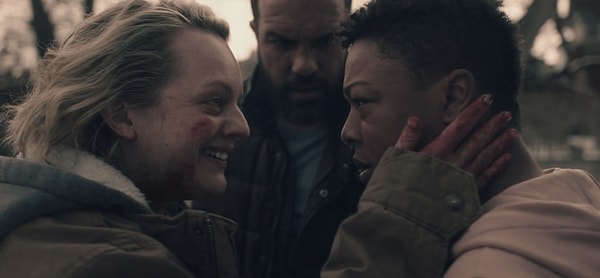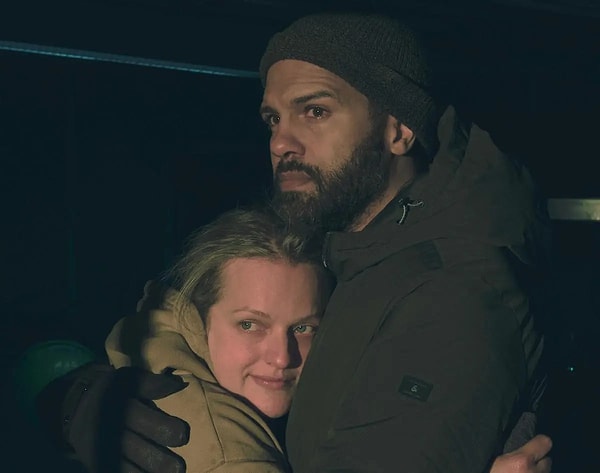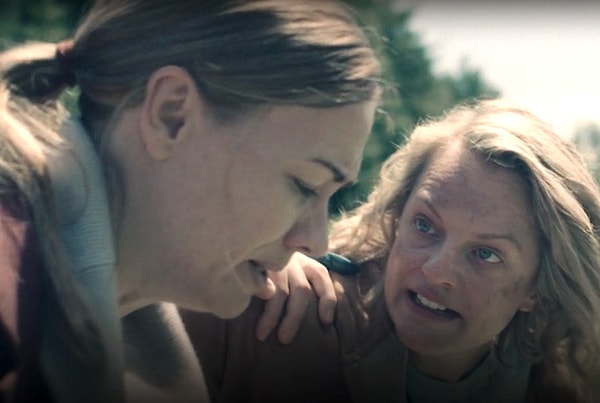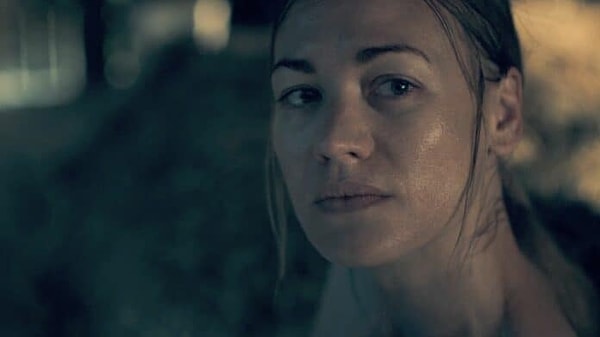Dreams to Come: Where June's Journey Is Leading in 'The Handmaid's Tale'
Season 5 began as a dream, blood swept across a washcloth, shower water pouring into a standalone bathtub--June covered in Fred, smiling, stuck in a moment of pure catharsis and elation. In the latter portion of season 4, we see an obsession beginning to form. Everyone around her has moved on with their lives. Rita had been in Canada for months. She identified her Stockholm syndrome dynamic with Serena, and she made a conscious choice to step away from it. Moira had spent several years learning to heal and help others. She was at a place where she could counsel women and show them down the path toward normalcy. Emily had taken that path herself. She was trying to go back to work, ease her wounds surrounding sex and relationships, and quell some of the anger she'd built up inside.
They lived the way we live. That was their gauge for normalcy, a return to the time before, where things like guns, violence, and vendettas were considered pathological signs of trauma, not a reaction to the world around them. They didn't look back, and they didn't put up a meaningful resistance. June saw that. She understood what they were doing, and she knew what it meant to move on. But that wasn't her normal. For years she'd faced salvagings, men violating women, brainwashing, and intimidation, and she couldn't just leave that behind. She tried their route. She spent time with Nichole. She would have night-ins with her friends, sipping wine and talking. They'd all laugh, go over the specifics of their time-before lifestyles, and then she'd say something awkward, and it would pop their bubble. She was overcome by guilt--a sense that there were other women out there who didn't have the life that they had. It hurt, living so well, while there were slaves toiling in commander's homes. She was in pain. She had gone through too much to just kick her feet up and ignore the rest of the world.
She couldn't live in the quiet moments, rest, laugh, and be with the ones she loved, because she wasn't with them. She was being waterboarded, cattle prodded, herded by attack dogs, and manipulated in Fred's office. That had to end. She knew it needed to end, and her best way to do that, she believed, would be to trust in the authorities. She gave her testimony to the ICC court, where she talked about her enslavement, and she waited for Fred's sentencing. Laying it all out there should've had a relieving effect; his sentence should've been the last nail in his coffin. Once she found justice, she thought she would find peace. But she didn't find justice. The American government made a deal with a man who had more blood on his hands than any man alive today. It was a bitter betrayal, part of a chain of events that would lead her to believe that she couldn't trust them to help. If she wanted revenge, she would have to get it her own way. She put her skills as a leader to use, gathered a group of handmaids, and they tore him apart with their bare hands in No Man's Land.

Courtesy of Hulu
After five years of being tortured and brainwashed, it was time for a true, modern slave--who had been repressing herself every second of every day--to break free. She let her rage loose, giving it the license it so thoroughly deserved. It was the culmination of something long awaited. Had she been able to, she probably would've reached back in time to take the hand of the young handmaid toiling in her room, or forced into bed in Jezebels, to let her know that it would be OK. She'd have her time in the woods.
The idea of a reversed salvaging must've been so tantalizing to her, turning the tables, using their own tricks against them. But like many rituals in Gilead, there was more to salvagings than she realized. They weren't necessarily about erasing somebody or punishing them for their crimes. The Sons of Jacob knew that the women would need an outlet for their rage. They'd spend their days pushed around by men with rifles, yelled at by the wives, and toyed with by commanders. All of the emotion--which erupted out of June when she killed Fred--would have to go somewhere. So they decided that it would be best put to use for the regime. They would lie to the girls, tell them that a crime had been committed--something would enrage them--and then they would give the girls permission to let that rage take over. They would work together to accomplish something, further a common cause, one that they could truly get behind.
Some girls would black out while others would hallucinate, or they would simply lose themselves, forget their humanity, and revert to a primal state of being. They would need to tap into something to literally tear flesh away from bone, and once they'd tapped into it there would be an electrifying rush, stimulating the reward center of their brain. It worked just like a drug. That was the sensation June was feeling when she stood in front of the bathtub.

Courtesy of Hulu
The salvaging ritual was built, not for release, but to create a writhing need to act out. The Sons of Jacob understood that revenge and violence take on a life of their own. When we free that instinct, it keeps coming, building upon itself, and it grows stronger as time goes by. It also takes a toll on our mental and physical states. That's why June started to obsess about Serena. She didn't let anything out. She had planted a seed.
She'd have this comical frown. She'd tremble and cry, and her voice would take on this strange tone. She was so strained and so terrified of what she'd become, it was like watching a monster trying to stop themselves from tackling someone to the ground. There was a visible push against it, and she stopped making sense. Why would she put her family in danger by sending Fred's finger to the ICC prison? What was she thinking when she went to the building where Serena was staying? Why couldn't she just breathe, calm down and ride it out? When someone is in the throes of mental illness, and we see that change come over them, it can be hard to identify with them. Many audience members were repulsed and unable to watch. This wasn't the woman that we loved. She was experiencing a level of mental anguish that we don't often see in fiction--literally white-knuckling it, struggling to stop herself from grabbing her gun and shooting somebody. Why would the show's creators force her to go through that? Why would they taint her image in our eyes?
To teach us a lesson. They were very aware of the effect that violence and revenge have on the human mind. Their depiction, as usual, was taken directly from research on the subject. In many stories, the protagonist shoots the killer, shrugs it off, and saves the princess before riding into the sunset. But that is not real life. In real life, violence has consequences, and that consequence was written all over June's face. She was tarrying with an inner demon. In order to move forward with her journey, and become the amazing woman we all want her to be, she would have to exorcise it.

Courtesy of Hulu
Throughout the season, many of us found ourselves second-guessing our reaction to mental illness in general. If we couldn't love June--a fictional character, whose trauma had played out in front of us over a period of years--then what did that mean for our loved ones, the people who struggle through addiction, mood disorders, and all of the other maladies that afflict the mind? Were we dismissing them at the first sign that something was wrong? Should we feel guilty for feeling this way? 'The Handmaid's Tale' exploits our uneasiness. They use it to elicit a specific reaction. In this case, they were using our repulsion to highlight something rotten inside of her. It wasn't just mental illness. It was the need to do harm, and it was consuming her from the inside out. We all saw it. Had she continued on that road, she would've ended up in prison or worse. I thought for certain that was where they were leading because there was no other logical conclusion to her actions.
Things did move forward. She began to focus on Hannah and the productive, distracting goal of getting her out of Gilead. It wasn't going to come to fruition, but June's voice did change. That ridiculous frown faded, and the light in her eyes returned again. Luke embraced her in the darkness, and they both reached out, touching one another's wounds, as they made a symbolic commitment to love one another regardless of their flaws. The moment they shared seemed to help. But none of it felt like it was going to last. June was still saying that she couldn't stop herself from hurting Serena, and the show's trailers were filled with visions of the couple sitting side by side in cages. Would June's need for vengeance lead her back to Gilead? It seemed inevitable.
The woman that crossed the border was not the same woman we saw standing in front of the bathtub. Luke had given her strength. Time had washed her wound just a bit. She was stronger, bolstered by her need to protect her husband, who had never seen Gilead before. Perhaps these things, along with her resolve to rescue Hannah, had given her the perspective she needed to get through her next encounter.

Courtesy of Hulu
In the latter portion of the third season, June was wounded, barely able to walk, and still reeling from her experience in the hospital with Natalie. She started speaking nonsense. She declared that she was going to 'get the children out--all of them.' Beth, Lawrence's martha (RIP), said that she would get put on the wall just for thinking that, and she was right. What June was planning was far too dangerous and far too risky to even consider.
June had discovered something that the rest of Gilead had yet to understand. They had so many restrictions. There was a way to talk, a way to way to move, guards all around, always checking passes and barking out orders. After a while, people began to accept that they were trapped and powerless, so they gave in and did what they were told. They didn't move beyond the confines of their prison, which at that point, existed not just physically, but also mentally. Once June stopped caring, and she was willing to take a risk, she was able to liberate herself and do things that most people believed to be impossible. It was an important step forward in her journey toward total freedom. She took another important step in a barn, which may or may not have had a manger.
June wanted to leave Serena to die when she was giving birth--truly, she did. We don't want to think that, of course. But that demon still needed exorcising. They showed her struggle to get the car free, and how frustrated she was, slamming things, her teeth bared. It must not have been easy to walk back inside the barn. But she realized that Gilead had conditioned her to look aside from human life and human decency like they did when they killed handmaids to remove their unborn children. She had always been the one that pointed out the moral failings of others. She couldn't lose that part of herself. Many have said that's what made her so special. She was the anti-Gilead, capable of countering their vicious cultural values. If she left Serena to die, she would be just like them--sacrificing the handmaid to save the child, taking the child away from its mother. She could never allow herself to be that person.

Courtesy of Hulu
She saw the undercurrent of Gilead's culture, pulling at her, turning her into one of them. It was a force ruled by fear and vengeance, the same demon that she had been struggling with. If she wanted to continue fighting, she'd have to conquer it within herself and be the change that she wanted to see in the world; otherwise, she wouldn't be able to inspire others the way she used to, and she wouldn't be able to pass her values down to future generations. She gave up her anger, comforted in the fact that she wasn't like Serena, and that this fight was much bigger than her petty need for revenge. It was intergenerational, culture, and it would take place on the world stage. She had no room for hate if she was going to take her inevitable place as a leader in the movement. She'd have to be an example to others--someone they could look up to and learn from, and that would have to begin with a line in the sand--love versus hate, information, not superstition, tolerance, not nationalism or bigotry. It was about people, not waving one flag or another.
June also loved Serena. When she said that she didn't want to shoot her when she had the chance, she meant it. For years she stood outside of her door, metaphorically putting a spotlight on her missing finger, her bruises, her pain, and the inequality. She saw everything that Serena had gone through, and she understood why she was so deluded.
This is all about the woman that June needs to become in order to be a successful fighter. We don't know how she will fight, or what that fight will look like. But we do know from interviews with Elisabeth Moss that it will be the theme of season 6. It's likely that June will have to stand outside a lot of doorways. Activism in 'The Testaments' is heavily tied to social work. There will be a massive underground railroad, run mostly by Mayday and the inhabitants of No Man's Land. Canadians will build a charity relief effort to help take in those who make it across. It will be an illegal, makeshift form of what we saw in the refugee center, where they would pass out clothes and food, offer them counseling, and a bit of comfort. This will take place in hidden shelters, backrooms, warehouses, and churches--away from the prying eyes of immigration and Gileadean spies. Many escapees will have Stockholm, abusive mindsets, and a strange way of thinking. Quite a few will want to go back. Citizens of Gilead are taught that their way of life is the only path to heaven and that leaving would mean eternal damnation. It's one of their most insidious lies. A woman like June will have to point out the moral failings of the regime, just like she did with Serena, and convince them that their basic survival matters more than some myth. She will have to have what is called the 'sociological mindset' and 'unconditional positive regard' to accomplish her goal. That will mean seeing past their flaws, their indoctrination, and all of the mess that Gilead makes of the human mind, and learning to approach them with a spirit of charity and kindness. There will be Serenas, commanders, slaveholders, and widows--people who did terrible things, and she will need the moral fortitude to help them just like everyone else. Reaching them will make all the difference, and after all, she did reach Lydia and Commander Lawrence. Maybe she can influence other important people. This will be integral to the fight against Gilead, because their greatest failure, aside from their corruption, will be their open borders. It's a weakness that those in Canada will learn to exploit. Mayday and the others will counter their brainwashing, teach Gilead's new generation about tolerance and equality, and help them learn to carry that torch, so they can continue the fight when people like June are dead and gone.

Courtesy of Hulu
Going West
The showrunner, Bruce Miller, doesn't always know what's going to happen next in the series. He has a general idea, but oftentimes things just fall into place. Lines are improvised. Facial close-ups are chosen at whim, and events come to pass of their own accord. Serena and June were not meant to meet on the train. That wasn't determined until after they filmed Serena giving birth.
The final season isn't set in stone, either. Miller does have an endpoint. But he's so fluid that we can't really determine how the characters will get to that place--not entirely. Sometimes they drop little hints here and there. We are hearing that June and Serena aren't going to make the journey all the way to Hawaii. Yvonne Strahovski confirmed suspicions in her most recent interview, saying that while she'd love to go surfing, the show seems stuck on its Canadian filming locations. She's thinking grizzly bears and forests, not treason and coconuts. Elisabeth Moss said the same thing. They think something will happen to the train. They're both consistent about it. It sounds right. Expect it.
We're also hearing that they wanted to keep June's reaction to meeting Serena ambiguous. She could punch her or offer her a diaper. It's up in the air. Miller, Strahovski, and Moss have all said this. There was a moment where they almost revealed what happens next during the filming, and they cut it out, preferring to go with another take instead. This means that season 6 will start a few minutes--or even seconds--after they left off. Miller is a huge fan of this technique. We know that there is a chance of dependency. Serena was pushing in that direction when she asked for a diaper. It was said that she knows Nichole's diapers wouldn't fit Noah. She just wanted to encourage a certain dynamic between them. But Moss says that this coming season will be about who chooses 'good' and who chooses 'evil.' June doesn't trust Serena very much. She might depend on her at some point, and things could go well. We also have to remember that Serena is still Serena. She could easily turn June in or betray her. That came up in an interview with Strahovski. Over the years I've learned to take every word they say into account. They don't improvise during interviews. They deliver very carefully crafted statements, almost word for word, and nearly all of it is foreshadowing.
Elisabeth Moss made a point to slip in an apology when she was talking about her work behind the scenes. She knows how hard it will be for us, but they are not going to rush through filming. They are taking their time to make the final season perfect. This means we will probably have to wait longer than usual for the premiere. I for one am perfectly happy to wait a little bit longer because I will not settle for anything less than the best. I'm glad they're able to do things on their own terms instead of struggling to meet a deadline.
Keşfet ile ziyaret ettiğin tüm kategorileri tek akışta gör!

Send Comment